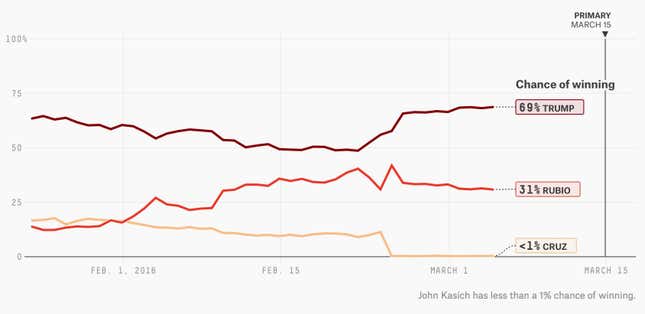Just this once, a digression into our unusual 2016 presidential campaign. On the Republican side, voters are distancing themselves from an establishment they have grown to distrust—with potentially dire consequences for the party.
Soon after I joined HP France in 1968, I determined that I would move to the US and live in the heart of the tech world, a dream that was fulfilled when I landed in Cupertino 17 years later. In 2001, I become a citizen in my adopted country. This makes me bi-cultural—my kind of fun. I’m equally happy and frustrated in my two countries. My Left Bank drinking companions at the Café de Flore call me a dirty capitalist because I belong to a venture firm, while here I’ve been called a socialist for my belief that—among other heresies—no one should be without healthcare.
In the thirty years that I’ve watched, and later voted in, US presidential elections, I’ve seen some perplexing candidates and campaigns—but nothing in memory compares to this year’s sorry spectacle on the Republican side. My French friends are quick to agree and, of course, offer their own analyses: How can this group of apparently bitter enemies, forced into an angry game of extremist, unrealistic positions, ever unite and rally around the ultimate Chosen One to help him (only the males remain) get into the Oval Office? And, they ask in horror… “Donald Trump?”
When the campaign season started last year, the French paid little attention to Donald Trump. They had heard of him, and a small number recalled that he had made presidential noises before, but his stints as a TV entertainer is what stuck and made him look like a mere mountebank riding an election hobbyhorse to garner publicity for his business ventures. Surely he would dismount when the skilled and serious politicians unsheathed their sharp knives.
I want to agree, but I’ve been reading Scott Adams’ blog. Adams created the famous Dilbert cartoons, and has authored several books, including How to Fail at Almost Everything and Still Win Big: Kind of the Story of My Life, an anti-advice opus in which he tells us that he never sets goals (“goals are for losers”) but, instead, he “manages opportunities” in order to let luck find him.
Early in the campaign, Adams predicted that Trump would defy convention, manage opportunities, and let the Republican nomination come to him. Adams’ central thesis is that Trump is a “Master Persuader“ who plays the game in 3D while his opponents plod on a 2D board. I don’t think I fully understand the thesis, and I occasionally disagree with Scott’s positions on other topics, but I bow to his unerring string of accurate forecasts.
Network TV having become available on the internet, many in France watched the Republican debates in horror and, being French, didn’t hold back the snark. One French wit imagined the first line-up as a remake of the Star Wars bar scene… and the game of “try to top this” was on. Regrettably, the best characterizations are unpublishable.
More seriously, the French started to draw parallels with their own upcoming presidential election. There, the far-right Marine Le Pen, daughter of historic right-wing politician Jean-Marie Le Pen, could end up in the Élysée palace by stoking the public’s disenchantment with the political establishment’s inability to address and rectify issues of high unemployment, social unrest, immigration, and other apples of discord.
The French remember what almost happened in the 2002 presidential election. In the first round (the French use a two-round election system), a “shoe-in” socialist candidate, former prime minister Lionel Jospin, was eliminated when Le Pen père placed second behind incumbent president Jacque Chirac. No way, said the French, we won’t elect this fascist. People who disliked Chirac nonetheless performed what they saw as their civic duty, voted en masse, and got him elected with an astounding, never-seen-before 82% of the vote.
Many in France fear that in the next presidential election, a weakened incumbent, François Hollande, and a divided conservative opposition could open a path for Le Pen fille. No one knows if the sense of civic duty will prevail this time, if people will hold their nose and vote for a candidate they dislike rather than electing a Le Pen.
US voters aren’t strangers to the lesser of two evils approach to voting. In the 1991 Louisiana gubernatorial election, Edwin Edwards, a “colorful” Democrat, was pitted against white supremacist David Duke. Faced with the prospect of an avowed neo-nazi as a state governor, even Republican George H. W. Bush urged everyone to vote for Edwards, the corrupt Democrat. The incident gave us a memorable bumper sticker:

Edwards won the election. Ten years later he began an 11-year sentence in a Federal penitentiary, rung up on corruption charges.
Here and now, in a tempting analogue, Republican voters might face the same type of unpleasant choice that the Louisiana voters had to swallow in 1991 and the French voters could soon face. Assuming for a moment that Trump is their nominee, Republicans could vote against him in one of two ways. They could either hold their noses and vote for the other side’s candidate, or they could abstain—which would certainly have the same result: a Democrat in the White House.
All things considered, I don’t think the parallel with France works.
First, the sentiment against Chirac was nowhere as strong as Republican sentiment against either of the Democratic candidates.
Second, Trump is the anti-establishment candidate. For all his negatives, he’s managed to absorb the energy and attention of disenfranchised, fearful voters who no longer trust professional politicians. As a result, the maneuverings of his establishment competitors, their often accurate and even relevant exposés of his excesses, misrepresentations, and, in normal times, disqualifying deeds and words, fall on deaf ears. As Paul Krugman recently wrote in an op-ed piece tartly titled “Clash of Republican Con Artists“ [as always, edits and emphasis mine]: “[…] the establishment’s problem with Mr. Trump isn’t the con he brings; it’s the cons he disrupts.”
Attacks against the interloper have intensified, resulting in a shameful debate last Thursday in Detroit. Candidates rolled in the gutter arguing over items of national interest… and organ size. I’m not making this up, see the debate transcript:
TRUMP: And he referred to my hands, if they are small, something else must be small. I guarantee you there is no problem. I guarantee.
Trump’s opponents managed to score some above-the-belt points and, perhaps for the first time, there were moments when The Donald appeared flustered, tired even. But, after the debate, his adversaries threw their advantage away. They were presented with a momentous opportunity to show fortitude, to really stand for their belief that Trump shouldn’t be given the keys to the White House. If Trump were the nominee, would they support him? Lamentably, they uneasily said they would. As reported by James Fallows in a strongly worded post titled “The 40 Seconds John Kasich Will Think About for the Rest of His Life,” when asked point blank what he’d do, Kasich, the most thoughtful candidate in the pack, missed a golden opportunity to stand and be counted: “He had the chance to hit a home run, as a big, slow pitch came right over the middle of the plate. He chose not to swing.”
Last week, Republicans brought out the heavy artillery, or so they thought, in the person of Mitt Romney. In a Mar. 2, 2016 speech, Romney called Trump a phony and a fraud, among other epithets, making a string of factually accurate points about the tycoon’s ventures.
When I saw Romney’s speech, I recognized the same well-groomed, intelligent patrician we saw in 2012, a candidate who almost got half of the popular vote in the last presidential election… but I wondered: Is it wise to send the party’s Ruling Class Supremo to the front line to argue the case against Trump? Is this a good way to sway Trump’s anti-establishment supporters?
Friday night, we got the beginning of an answer. A New York Times article titled “Rank and File Republicans Tell Party Elites: We’re Sticking With Donald Trump“ lays out the country-wide negative reaction to the Republican big-wigs’ latest moves. It seems to boil down to: “I know he’s crooked, they’re all crooks, we’ve seen their work. I’ll vote for my own crook.”
Now what?
In game theory, there are situations where everyone dies because no one is willing to jump overboard to save the fragile rescue boat from capsizing. Chris Christie jumped out for Trump, but no one in the Cruz-Katich-Rubio boat is willing to make the sacrifice and support one and only one anti-Trump candidate.
To Be Sure™, we don’t know what will happen on the Mar. 8 and 15 primaries. Trump could lose big, one of his opponents could emerge as a credible alternative and cause everyone else to support him. But that’s not what latest estimates show. Turning to the excellent FiveThirtyEight site that gives us an interactive history of forecasts by state, we see how poorly Marco Rubio could fare in his home state of Florida:

(FiveThirtyEight was devised by champion forecaster Nate Silver after he left the New York Times. It’s well worth a visit.)
Other than an improbable turnaround at the polls, the only hope left is a white knight, someone like Michael Bloomberg, throwing himself into the fight against Trump, or perhaps so-far-not-candidate Mitt Romney who could be tempted to avenge his 2012 defeat… but no, none of that removes the establishment taint.
For the Republican nomenklatura, this leaves the paralyzing dilemma intact. Pick your poison: the reviled Trump or a hated Democrat.
We’ll soon see how regular Republican voters, who seem to be coming to the polls in larger numbers than usual, will pick their crook.
This post originally appeared at Monday Note.
